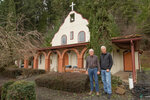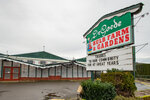


Brothers Jack and Bob DeGoede — owners of the iconic DeGoede Bulb Farm, a staple in the Mossyrock community for nearly 50 years — finally closed a sale of the farm at the beginning of January.
The DeGoedes sold the farm to Telat Sipahioglu and his father, Mehmet, owners of Wazelnut Farms in Montesano. The sale came after the DeGoedes announced their intention to retire last summer and initially began their search for a buyer. Wazelnut Farms specializes in growing hazelnuts and will be branching out into strawberry production in the DeGoede greenhouses.
DeGoede Farm history
Before Jack and Bob took over the farm from their father, Hank DeGoede, Hank emigrated from Holland in 1948 to Chino, California, where he met his wife, Hildegarde, who was working on her parents’ dairy farm.
Hank’s family grew flower bulbs in Holland, and he eventually moved up to Washington and began growing bulbs in the Mount Vernon area in Skagit County.
Jack explained Hank moved after being urged by a fellow Dutch immigrant who was a traveling bulb salesman who got stuck in the U.S. after Nazi Germany invaded Holland during World War II and ended up staying permanently.
“Luckily he had his wife with him on that trip,” Jack said of the salesman. “... After the war he figured he needed expertise in bulb growing, so he brought over I think four farmers, our father and three others, to help him with his business. And in 1951, our father went out on his own.”
In 1976, after 25 years in Skagit County, the DeGoede Bulb Farm moved to Mossyrock.
“Our father was farming all over the Skagit Valley in rental parcels, and he wanted to consolidate into one location for efficiency and for lighter soil,” Jack said.
In Mossyrock, Hank successfully consolidated his farms, combining all the different flowers he was growing onto the 160-acre farm. It wasn’t long before Jack and Bob took over the family business.
“It was the move here and the opportunity to expand. We weren’t (originally) doing green houses, so it was an opportunity for us young guys to get involved,” Bob said. “Dad was good with that.”
Mossyrock operations
Bob added, when they first moved to Mossyrock the farm was only growing tulips, daffodils and iris bulbs. Jack and Bob took over when Hank, like them last year, decided to retire.
“Then we expanded into so many things, a lot of different field-grown perennials. In the green houses we were growing everything from poinsettias to hanging baskets to potted bulbs and more perennials, and then we also started a retail store,” Bob said.
After nearly 50 years in Mossyrock, the DeGoede Bulb Farm grew a large base of repeat customers, with some traveling quite the distance to buy flowers.
Customers came from as far away as Seattle, Portland, Yakima and even further east in Washington. Bob also said some would come not even to shop but just to visit, taking time out of their road trips to enjoy the display garden DeGoede Bulb Farm featured to walk through some of the flowering fields.
“Many times we’d be in the retail garden center there, (and) we’d get coffee and we’d get people coming up to us, people we didn’t know … saying, ‘Are you the owners of this place? You know, we’ve been coming here for 30 years. You can’t be closing!’ ” Jack said.
During their time expanding the farm, the brothers provided a lot of work locally in the Mossyrock community, Jack stated.
“Our goal was to have employment for our people year-round because, out here, it’s a little more challenging to get help,” Bob said. “We were able to get it to where we had about 100 people full-time, year-round, at the height of our growing.”
Some of their employees worked for them for more than 30 years, as well. Jack added, during the farm’s sale process, many other local Mossyrock businesses and farms were anxious to poach DeGoede employees.
“A lot of people knew our people and were asking when we were going to start releasing them so they could hire them on,” Bob said.
Some former DeGoede employees even started their own businesses in the area, including their former green house supervisor.
“He’s starting a little garden center by the cemetery … not quite at the scale we were at but selling shrubs and baskets and things like that,” Bob stated.
Just as they took over the family farm from their father Hank, Jack and Bob had hoped some of their children would be interested in taking over the farm once they retired but found themselves in a situation many other farmers face nationwide — their children choosing to pursue other careers.
There are no hard feelings, however, as they admitted being a farmer means assuming a particular kind of life that has very few days off, carries a great deal of risk and often comes with slim profit margins.
“We were even kind of getting to that point where we would have to invest a lot in things like upgrading our greenhouses just to keep up with innovations,” Bob said. “And we’re talking millions of dollars in investment to upgrade these days. It’s huge. As a young person, you’re making a life-long commitment getting into farming.”
“Young people want to be free, and I don’t blame them,” Jack added.
Future of the farm
While the DeGoedes would have liked for the old farm to continue to grow bulbs, they said they were happy to see the land still used as a farm, at least. Bob acknowledged, though, that because the farm’s fields were so diverse, it made it a harder sell.
“The bulb industry, especially in the U.S., is kind of a dying industry. It’s kind of, in a way, being pushed out by production in Holland and Europe. It’s more efficient,” Jack said. “There’s only a couple of growers left here.”
During their search for a buyer, they had offers from people who wanted to use the land for everything from a truck scrap yard to a cattle slaughterhouse and meat-processing plant. Luckily, Sipahioglu also wanted to expand his own family’s farm.
Bob explained they were happy to sell to Sipahioglu as he intends to keep using the greenhouses the DeGoedes built.
“In the greenhouses, they plan on doing in-door strawberries for the off-season, from the fall until spring,” Bob said. “The strawberry growing will be kind of a hydroponic type with some of the newest innovations coming out of Europe, so they have to retrofit the green houses.”
Like the DeGoede family who emigrated from Holland, which specializes in flowers, the Sipahioglu family emigrated from Turkey, which specializes in hazelnuts.
According to Pacific Nut Producer Magazine, Turkey is the largest producer and exporter of hazelnuts in the world and accounts for 70% of world-wide hazelnut production along with 75% of exports.
As for Wazelnut Farms, The Chronicle contacted Telat Sipahioglu on Tuesday to ask him about his family’s farm, a 200-acre hazelnut orchard in Montesano that has been operating for six years now, and the purchase of DeGoede Bulb Farm.
“We’re actually not farmer-born. This is something we got involved with later on in our lives, but our hazelnut orchard is doing pretty good,” Sipahioglu said.
The interest in strawberry production is to keep the farm producing year-round, and hydroponics are being utilized to grow the best possible product.
“Our goal with the strawberries is to produce the highest-quality, best-tasting and best-looking strawberries, not to maximize volume,” Sipahioglu added.
Sipahioglu hopes to have strawberries planted by the end of this summer and aims to be producing by spring of 2025. And while DeGoede did feature retail sales, Sipahioglu stated, to start, he will focus solely on commercial sales.
“I’m sure, eventually, we’ll have some kind of (store) front to connect with the community and offer our strawberries and hazelnuts in small batches,” Sipahioglu said. “I know people really loved DeGoede and coming there and buying plants.”
For more information, contact Wazelnut Farms on its Facebook page, https://bitly/482o8YK.